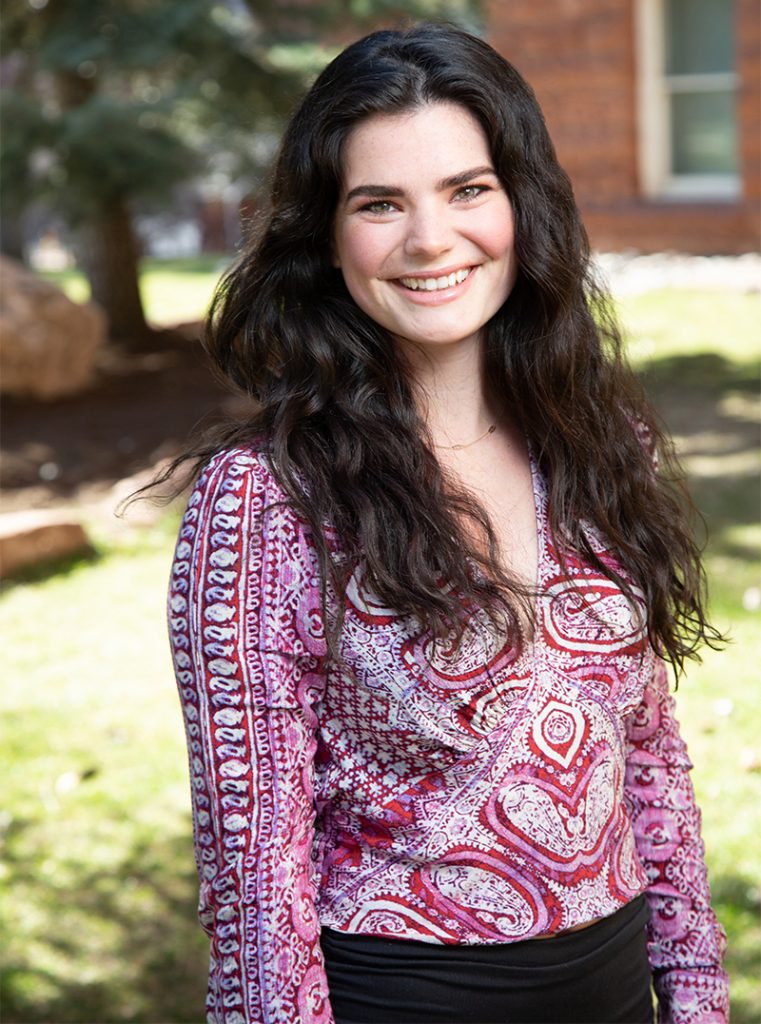April 30, 2019
Molly Carney is not your typical foodie.
The Northern Arizona University senior, who graduates in May with a degree in environmental studies and sustainability, discovered purple carrots, the emotional and cultural connections food creates and the importance of sharing good food with others during her four years in Flagstaff. Her interest in food, though, doesn’t stem from trying new restaurants or sampling new dishes. It’s all about food access, food insecurity and ensuring people in her community get enough to eat.
Once she discovered this drive, it became the focus of her volunteer work, her research and eventually her career plans. For the one-time art major, the shift was immediate—it happened while doing homework for a writing course required by the Honors College.
“I remember the moment clearly—I was typing up a research paper on vegetarianism and it hit me—food is an absolute necessity and this life force controls and is controlled by people, policy, economics and the environment,” Carney said.
That epiphany led to changing her major, volunteering with Flagstaff Foodlink, where she now works, and applying the philosophy and theory she learns in her classes to applicable ways to not only ensure people in the community have enough food but to start a movement that reconsiders food systems and the benefit of a strong local food system.
“In my experience with Foodlink, I have gotten a taste of the power connection and inclusivity can have on a local food system and economy,” she said. “I believe that all people should have all access to foods—foods that are emotionally, culturally and physically appropriate and accepted by the consumer.”
While at NAU, Carney applied for and received a 1% for the Planet grant from Patagonia to fund the Flagstaff Fruit Tree Project, which is a community-led effort designed to put otherwise wasted fruit to use. The project connected volunteer pickers with fruit tree owners, who go to trees on private, public and commercial property to pick fruit, keeping what they want and donating the rest to local food banks and pantries. Before, this fruit often rotted on the tree or ground.
It came about after a bumper crop of fruit in 2018, Carney said. The Foodlink team saw the fruit on the trees and saw the food insecurity in their clients and they created a community gleaning project to harvest the unused fruit, diverting hundreds of pounds of fruit into people’s homes.
Not only does it help combat food insecurity by providing skills and knowledge, it supports community connections through the act of urban gleaning and gives people hands-on experience with their food.
This wasn’t all Carney made time for at NAU. She also enrolled in the Honors College’s Grand Canyon Semester, which enables students to live on and study the Colorado Plateau, allowing the native Georgian to build an intimacy with the Southwest that she never imagined was possible. Carney had field study experiences in natural and social sciences, getting opportunities to engage with the land’s history, both in natural and human terms. After she completed the course, she was hired as a recruiter of sorts to encourage other students to enroll.
“Many call Grand Canyon Semester a once-in-a-lifetime experience,” she said. “For me, GCs was a first-in-a-lifetime experience. GCS really served as a catalyst for experiential education in my life and totally reshaped my understanding of what higher education could and should be.”
But even in the classroom, Carney’s experiences went above and beyond. She talked about her appreciation of the Socratic methods Honors College faculty employ, pushing her to think deeply about her ideas and the ideas presented by those around her. She completed creative projects and signed up for writing classes and worked closely with her professors, building those relationships that helped her to succeed. Ted Martinez, who taught the Plants and People course that led to Carney’s career switch, also supervised her work as a student and then program assistant for the Grand Canyon Semester. She played a critical role in ensuring enough students signed up last year, he said.
“Her passion for learning really stands out,” Martinez said. “From the first class I had with her, she really had a passion for learning about food, health, diet and food systems. That passion followed her to Grand Canyon semester. It’s an immersive, multidisciplinary domestic study abroad where the Grand Canyon serves as the focal point to learn deeply about people, place and culture. Molly was a leader among her peers in the GCS program.”
After commencement, Carney is enrolling in NAU’s Sustainable Communities graduate program; she hopes to use that to build on her undergraduate research experience and combine food analytics, political ecology, connectivity and art to produce an accessible series of maps that allow people to easily engage with this data in their community. She will continue to work with Flagstaff Foodlink as well.

Heidi Toth | NAU Communications
(928) 523-8737 | heidi.toth@nau.edu



